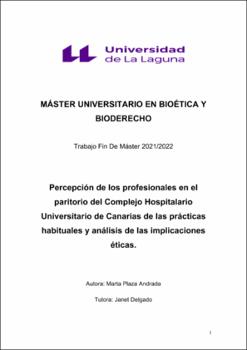Percepción de los profesionales en el paritorio del Complejo Hospitalario Universitario de Canarias de las prácticas habituales y análisis de las implicaciones éticas.
Author
Plaza Andrada, MartaDate
2022Abstract
Introducción: El parto es un momento único e irrepetible en la vida de cada
mujer, para acompañarlo adecuadamente es imprescindible que los
profesionales sigan las recomendaciones basadas en la evidencia que proponen
las Guías de Práctica Clínica (GPC), los Códigos Deontológicos y cumplir con
los principios de beneficencia, no maleficencia, autonomía y justicia.
Justificación: Pese a que las GPC deberían orientar nuestra práctica habitual,
se observa que dichas recomendaciones no acaban de implantarse en los
servicios, y aunque sí se viene realizando un cambio gradual en las prácticas, a
día de hoy aún encontramos diversidad de opiniones.
Objetivos: Determinar cómo perciben los profesionales del servicio de paritorio
del Hospital Universitario de Canarias (HUC), las prácticas que en él se realizan,
así como sus implicaciones éticas.
Metodología: Se realizó un estudio de tipo cuantitativo, descriptivo y trasversal
a los profesionales que trabajan en el Paritorio del HUC, preguntando sobre las
percepciones que tienen de las prácticas habituales que se realizan en el
servicio.
Resultados: Se obtuvieron datos de 63 participantes. En primer lugar, se
extrajeron los resultados generales. Al separar dichos resultados por grupos de
edad, género, años de experiencia y categoría profesional, y compararlos, se vio
que las preguntas referentes a la idoneidad de realizar el expulsivo en bañera y
el momento de realizar el ingreso en la unidad de paritorio, ambas en mujeres
de bajo riesgo, fueron las que mayor diferenciación de respuestas obtuvieron.
Discusión: Comparamos lo que recomiendan las GPC con los resultados de
este estudio, viendo las implicaciones éticas de estas actuaciones
Conclusiones: Los profesionales del HUC perciben de manera similar las
prácticas que se realizan en el servicio, no encontrando mucha diferencia por
grupos de edad, género, años de experiencia o categoría profesional. Según
esta percepción las prácticas en ocasiones se acercan y otras se alejan de las
recomendaciones de las GPC. Introduction: Childbirth is a unique and unrepeatable moment in the life of each
woman, to adequately accompany it, it is essential that professionals follow the
evidence-based recommendations proposed by the Clinical Practice Guidelines
(CPG), as well as the Code of Ethics and complying with the principles of
beneficence, non-maleficence, autonomy and justice.
Justification: Despite the fact that the CPGs should guide our usual practice, it
is observed that these recommendations have not yet been implemented in the
services, although a gradual change in practices has been made, to this day we
still find a diversity of opinions.
Objectives: To determine how the professionals of the delivery room service of
the Hospital Universitario de Canarias perceive the practices carried out there,
as well as their ethical implications.
Methodology: A quantitative, descriptive and cross-sectional study was carried
out on the professionals who work in the delivery room of the Hospital
Universitario de Canarias (HUC), asking about their perceptions of the usual
practices carried out in the service.
Results: Data were obtained from 63 participants. First, the general results were
extracted. When these results were separated by age groups, gender, years of
experience and professional category, and compared, it was seen that the
questions regarding the suitability of carrying out the delivery in the bathtub and
the time of admission to the delivery unit, both in low-risk women, were the ones
who obtained the greatest differentiation of responses.
Discussion: We compare what the CPGs recommend with the results of this
study, seeing the ethical implications of these actions.
Conclusions: HUC professionals perceive the practices carried out in the
service in a similar way, not finding much difference by age groups, gender, years
of experience or professional category. According to this perception, practices
sometimes come close and others move away from the recommendations of the
CPGs.





